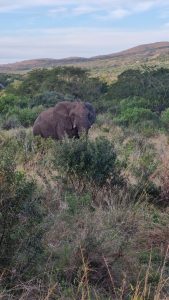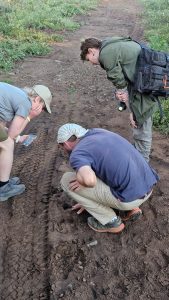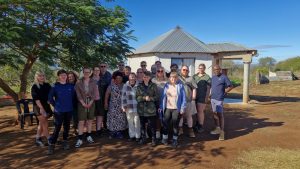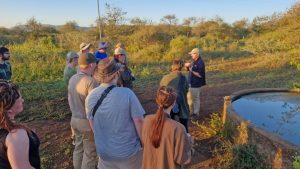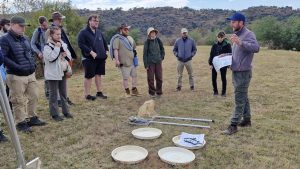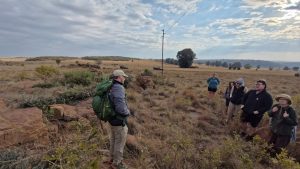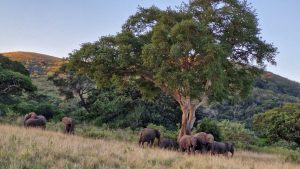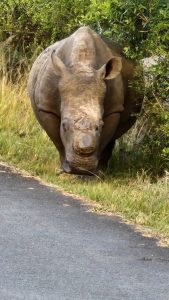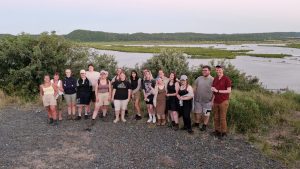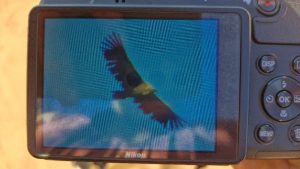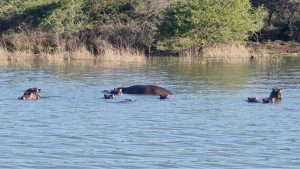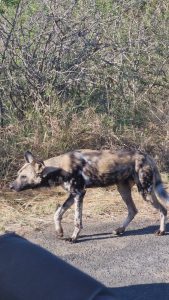- Course code: ND24
- Institution code: N64
- University name: DN Colleges Group
- Campus name: University Campus North Lincolnshire (UCNL)
- Campus code: N
The Foundation Degree in Animal Welfare Science focuses on the key components that shape animal welfare across a range of settings and interactions. This hands-on programme blends practical experience, scientific theory, and transferable skills, delivered through engaging, interactive sessions that consolidate knowledge and build confidence.
Students graduate with a well-rounded education, equipped for a wide range of roles within the animal sector. Career planning and personal development are embedded throughout the course, helping each learner identify and pursue meaningful pathways.
Our purpose-built animal unit houses a wide range of native and exotic mammals, reptiles and amphibians, enabling the study and assessment of physiological and behavioural systems, providing students with an understanding of animal welfare in a range of contexts.
Assessments are designed to showcase competencies in authentic scenarios, with final grades reflecting sector-relevant knowledge and skills. Students benefit from small-group teaching, interdisciplinary enhancement activities, and field trips—locally, nationally, and internationally, with South Africa being the highlight.
Whether you’re passionate about companion animals, wildlife, or working in policy and education, this degree provides a strong scientific foundation and a clear path into the animal welfare sector.
A part-time variant will be available in the 26/27 academic year.

Key Information
-
Course Level
Level 5
-
Delivery
Full-Time
-
Duration
Full time: 2 years with lessons typically over two days a week A total of 80 hours of work placement across the years of study
-
UCAS Code
ND24
-
Awarding Body
This course includes the following core modules that all students complete:
Full-time and part-time options are available for both years of the programme. Students are required to commit to attending for two days per week in term time. Past students have found this very helpful for balancing childcare and employment commitments. Work experience is a key component of the programme and students are given the time during the academic year to identify and undertake placements. Independent study is required throughout to complete assessments and prepare for lectures, seminars and tutorials.
YEAR 1
- Professional Development and Academic Skills (20 credits)
- Animal Health (20 credits)
- Animal Husbandry and Management (20 credits)
- Animal Welfare (20 credits)
- Biological Systems (20 credits)
- Ecology and Biodiversity (20 credits)
YEAR 2
- Anthrozoology (20 credits)
- Research Project (20 credits)
- Continuing Professional Development (20 credits)
- Animal Nutrition (20)
- Applied Animal Behaviour (20 credits)
- Wildlife Conservation (10 credits)
- Genetics (10 credits)
Occasional changes to modules and course content may take place. Students will be notified when applicable.
The primary way of delivering this course is on campus. On campus teaching includes a combination of lectures, small group seminars, workshops, guest lectures and one-to-one discussion with your tutor. Students will receive between 10 and 15 hours of teaching time per week throughout this course, depending on the mode of study. Additional one-to-one meetings with tutors will provide further support.
Students are assessed through a diverse range of methods that reflect the applied nature of animal welfare practice. These include practical assessments such as handling and laboratory work, alongside professional discussions and debates, written assignments—including case studies, reports, and training plans—posters and presentations, exams, and portfolios. This varied approach places a strong emphasis on developing sector-relevant knowledge, practical competencies, and critical thinking skills essential for working in the field of Animal Welfare
Applicants would normally be expected to have a minimum of 32 UCAS Tariff points or equivalent qualifications. We also encourage applications from mature students, and we are committed to creating educational opportunities for people from a variety of backgrounds and situations. If you have been out of formal education for some time, and/or you do not have the qualifications stated, we might still be able to consider your application and offer you a range of support. We are here to help. Please get in touch to find out more.
This course is particularly relevant for those already working in, or looking to build a career within, the animal industry. It provides a broad range of skills applicable across multiple professional contexts, combining scientific knowledge with practical expertise.
Graduates have gone on to work in diverse roles including laboratory technician, animal nutritionist, veterinary pharmaceuticals, teaching, zoo education officer, animal collection keeper, animal rescue facilitator, and self-employed animal welfare practitioner. The course supports both entry into the sector and career progression within it.
For those wishing to continue their studies, the programme offers a strong academic foundation for further qualifications. Progression routes may include degrees in Zoology, Animal Biology, Wildlife and Conservation, Animal Behaviour, Animal Studies, Animal Welfare, or the BSc (Hons) Applied Animal Welfare (Top-Up).
Financial Support
UK students may be eligible for support via loans and grants.
Course Fees
UK
£7940.00 Per Year FT £5293.00 Per Year PT
Additional Costs
Your Tuition fees cover most costs associated with your course (including registration, tuition and assessment.)
There may be some extra costs that you might need to make, or choose to pay, for example:
• Books (you’ll have access to books from your module reading lists in the HE library, but you may want to buy your own copies)
• Printing and photocopying
• Trips and enhancement opportunities
• Students will be required to purchase a lab coat and a kennel coat in preparation for starting the programme. There will also be occasions when additional costs will occur, e.g. poster printing, trips and educational visits
If your course includes a work placement, you may be required to pay for a Basic or Enhanced Disclosure and Barring Service (DBS) check.
Apply or Enquire
Applying to multiple providers, including us?
Applying only to University Campus North Lincolnshire? You can directly apply.
If you are applying only to University Campus North Lincolnshire and not to any other universities or providers, you can do so directly by using the following link.
Want to make an enquiry?

